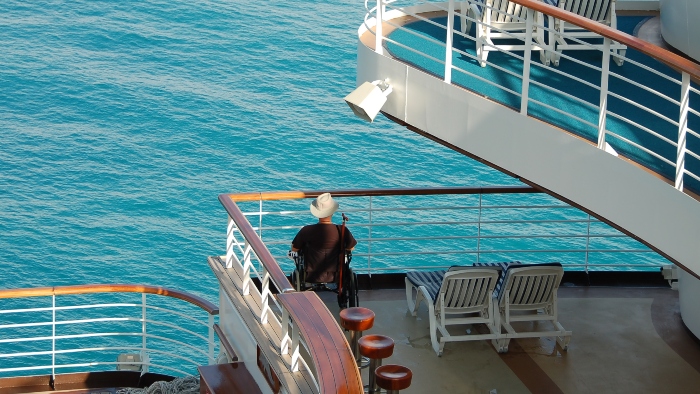Guide For Disabled Cruisers
Cruises for disabled passengers are now more enjoyable than ever with numerous cruise lines modernising vessels and enhancing accessibility. Many ships provide easily accessible layouts, allowing those with mobility difficulties to get around whether they're in their cabin or enjoying the facilities, as well as trained staff and medical teams on hand to assist where possible. Cruises for disabled passengers are also easy to book thanks to this guide and our helpful team.
From the enquiry process to arriving onboard, the first and most important thing to do is make sure you communicate your requirements to your travel agent, the cruise line and the airline. By doing so, as many arrangements as possible can be made before you travel, such as assistance to board the flight and/or to board the ships, ensuring your holiday is suitable for disabled passengers.
Must do's when booking cruises for disabled passengers:
- Do make your travel agent aware of your mobility or medical needs at the time of your enquiry.
- Do make sure you fill in the cruise line's medical form accurately.
- Do contact the airline in regards to any mobility needs before you travel.
- Do request any medical equipment, such as a sharps bin or medical fridge, before you travel.
- Do book early if you require a disabled access cabin.

What To Consider At The Time Of Enquiring
Disabled Access Cabins
When enquiring about your chosen cruise, ensure your agent is aware of any medical or mobility assistance needs you may require during your holiday. Many modern cruise ships boast comfortable, spacious disabled access cabins, and your agent will be able to ensure one of these is selected for you. Alternatively, if they are booked up, your agent can provide other itineraries that you may prefer.
Medical Request Forms
Upon booking your cruise, cruise lines will provide a medical request form for you to declare any mobility needs, such as the use of disabled wheelchairs and mobility scooters onboard, as well as a fridge or disposal unit requirements for sharps and used medication.
Shore Excursions
Most shore excursions are offered by third party companies, so before you book either enquire with the cruise line or with any local shore excursion companies to see what packages they offer that will be suitable for disabled cruisers to participate in. You may find that not all of the cruise excursions are suitable for disabled passengers. This could be due to accessibility restrictions such as if the excursion is accessed by a tender boat, or the pace of activities taking place.
What To Consider Before You Travel
Contact your airline
Once you have booked, your agent will be able to assist you in contacting the airline to inform them of any disability requirements. Essential medical equipment such as wheelchairs or walking sticks travel for free, which will often be stored in the hold and taken at check-in or at the gate. The airline will assist you to your seat through suitable transportation and assistance.
Documentation
Ensure you have all your documentation for any disability needs, as this will allow the airline to assist disabled cruise passengers as best as possible. Notifying the airline before you travel means they should have all the arrangements in place to look after you once you have arrived at the airport.
Transfers
To ensure your journey is as smooth and as stress-free as possible, private transfers are an excellent addition when booking cruises for disabled passengers. Usually bookable at an additional cost, private transfers will transport you to your cruise and assist you with your luggage, making it a great choice for those with mobility restrictions.
Service Dogs
If you travel with a service dog you must alert the cruise line before you travel. Service dogs are permitted on all cruise ships, though they may not be allowed to disembark in all ports and special documentation may be required in some ports. You may also be asked to provide vaccination records, International Health Certificate or written proof of the dog's training as a service animal.
It is essential that you alert the cruise line as soon as possible if you intend to travel with a service animal. There may be a limit to the number of animals that a ship can accommodate, therefore the earlier you alert the cruise line the better. By contacting the cruise line early you give yourself more time to send the required documentation and find out information on which ports you can embark/disembark.
What To Consider When Travelling With Restricted Mobility
Wheelchairs
For those who require a wheelchair, a disabled access cabin is vital as standard cabins are usually not designed to accommodate wheelchairs. Disabled access cabins have wider doorways and ample floor space to ensure complete ease of use when you are in your cabin. Bear in mind that ships do not supply wheelchairs apart from during pier assistance.
Mobility Scooters
If you use a mobility scooter, you will need to check at the time of enquiring whether they are allowed onboard. Some ships are not suitable for them, while other cruise lines will have stipulations in regards to the battery type and whether the scooter is collapsible. If you are planning to take your mobility scooter on a
P&O cruise or
Cunard cruise, be sure to request an adapted cabin at your first point of enquiry to avoid disappointment.

What To Consider While Onboard
Crew
The crew onboard will do everything they can to help when it comes to boarding or providing accessible tables in restaurants and lounge bars. The theatres onboard usually have areas for disabled passengers with wheelchairs and many other provisions are accounted for. The crew however, for legal reasons, are not allowed or trained to offer care assistance onboard.
The crew however, for legal reasons, are not allowed or trained to offer care assistance onboard.
Cabin Alert Kits
Most cruise lines can offer alert kits for passengers with hearing impairments. These kits are fitted to your cabin and include visual-tactile alert systems so passengers know when someone knocks at the door, if the in-cabin phone rings, when the alarm clocks sounds or if smoke detectors go off.
Don't Be Afraid To Ask
If you need any further information on which cruise lines cater best for your needs or advice on your cruise once you have booked, please don't hesitate to contact our sales and customer care teams and we will be happy to help. Our team is filled with experienced cruisers who receive regular training, so whatever your queries, we will have a team member who can advise you or help you make any of the necessary arrangements.
For more information on mobility and other special access cruise queries, please see the Iglu Cruise Helpcentre